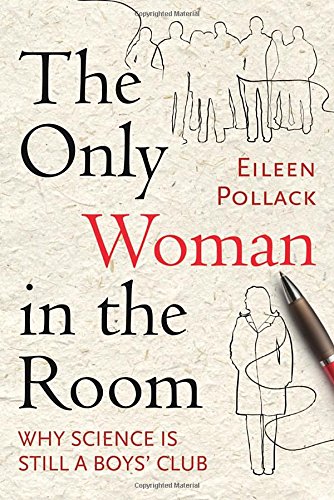
The Only Woman in the Room
Why Science Is Still a Boys' Club
- اطلاعات
- نقد و بررسی
- دیدگاه کاربران
نقد و بررسی

July 1, 2015
An unvarnished account of what it was like, in the mid-1970s, to be "one of the first two women to earn a Bachelor of Science degree in physics at Yale." Pollack (Creative Writing/Univ. of Michigan; Breaking and Entering, 2012, etc.) reveals why, after working so hard to become a physicist, she decided against enrolling in a graduate program, opting instead for a career as a writer. In part, she explains, her decision was a belated response to then-Harvard president Lawrence Summers' suggestion, in 2005, that genetic difference might explain why few women attained tenured faculty positions in hard science. Pollack first studied current statistics in order to determine how things have changed since then. To her surprise, she found out that today, women still earn only one-fifth the number of doctorates in physics. A "nerdy" aptitude for science or math, writes the author, "strikes most cruelly at adolescent girls." This was the case for her and is still true today. Being the smartest girl in the class (like the author was during her adolescence) is often a recipe for social failure. Through high school and then at Yale, Pollack faced the distressing reality that being smarter than the guys was an automatic romantic turnoff. In her case, the fact that she had attended public schools put her at further social and academic disadvantage at Yale, where most students had attended elite private schools. Moreover, she was not included in the informal study sessions held by male students. She also experienced subtle discrimination from some faculty members. Her grim determination to succeed academically meant that she spent long hours alone trying to master the difficult course work. She achieved academic success but at a terrible psychological cost, as she suffered from physical ticks, bulimia, and depression. Throughout this important book, Pollack provides compelling answers to Summers' ill-considered remarks. Hard-hitting, difficult to read, and impossible to put down.
COPYRIGHT(2015) Kirkus Reviews, ALL RIGHTS RESERVED.

October 1, 2015
Pollack was one of Yale University's first two women to earn a bachelor of science in physics. In her latest book, the author explores the reasons why she became a full-time writer rather than a physicist. Organized chronologically, this title reaches back nearly 45 years to tell Pollack's story, which echoes the experiences of many women in science who have faced isolation, stereotyping, and gender discrimination. She interviews former teachers, classmates, and professors to recount her experience in the first two thirds of the book. In the last third she talks to contemporary professors and students at Yale and affirms that women are still challenged to break into the boys' club of scientists. VERDICT While other titles detail the barriers women encounter upon entering science fields or even contemplating STEM careers, Pollack's personalizes the data while delivering an honest, readable, and brave rendering of her experience. Another strength is that the author relates well the struggles any young person endures simply deciding what they want to be.--Faye Chadwell, Oregon State Univ., Corvallis
Copyright 2015 Library Journal, LLC Used with permission.

September 1, 2015
America's efforts to increase recruitment in STEM fields might have kicked into overdrive, but representation of women in the sciences is still woefully anemic. The proliferation of tech workshops targeted specifically at girls notwithstanding, Pollack (Breaking and Entering, 2012) points out that the reasons might be more insidious than commonly imagined. In her memoir, she lays bare the severe self-doubt and low self-esteem she grappled with despite being one of the first women to graduate with a degree in physics from Yale. Worse, she argues, much of the sexism she encountered in the 1970s is pervasive even today. The end result of all that see-sawingand a lack of consistent positive feedback from her professorswas a switch from a career in theoretical physics to one in writing. Pollack is on less-sure ground when she tries to extrapolate her data sample of one to speak for many women and draw more sweeping conclusions. Yet her memoir rings authentic, its lessons essential. A bitter pill to swallow but a vital addition to the important and frustratingly ongoing discussion about gender equity.(Reprinted with permission of Booklist, copyright 2015, American Library Association.)




دیدگاه کاربران